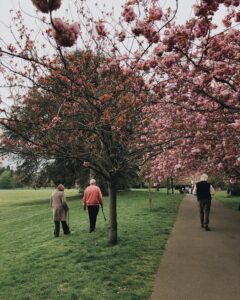By Sharon Oliver, Contributing Writer

REGION – Don’t let the name fool you. People of all ages can thrive from living in age-friendly communities. Besides, everyone ages beginning from birth. Not only are there some well-thought-out community living plans within the Commonwealth, but a focus is placed on age-friendly businesses as well. But what does being an age-friendly community mean? It’s a place that adapts its services and physical structures to be more inclusive and receptive to the needs of its residents as they age.
Certifying businesses
How do age-friendly businesses differ from any other ordinary businesses? “An age-friendly business is one where people of all ages and abilities can comfortably shop for goods and services,” said Andrea Burns, director at Age-Friendly Boston of the Age Strong Commission. “In order to be certified, businesses take a customer service training called, ‘Communicating with Older Adults.’ And we evaluate the physical spaces of the business, as well as the communication policies and hiring practices.”
Some features for such a business should include easy-to-open entry doors, a noise level suitable for hearing and speaking, and bathroom accessibility for people with mobility issues to name a few.
City of Salem a leader
In 2015, the historic city of Salem became one of the first Massachusetts municipalities to join AARP’s Network of Age-Friendly States and Communities. It also launched the Salem Skipper in 2020, an on-demand, low-cost rideshare service operated by the city. Residents can hail a ride on a Skipper van for any destination within the city by calling or by using a mobile device app. Seniors, students and people with disabilities pay $1 per trip while all others pay a fare of $2 per trip.
Salem for All Ages, the city’s 2016 age-friendly action plan, contains other proposals and in 2021, the co-chairs accomplished another achievement thanks to an ordinance allowing accessory dwelling units (ADUs). These secondary living quarters which exist on the same property lot as a primary residence are popular since it allows family members, particularly the more senior adults, to live within close proximity to loved ones and to continue live independently. It’s a win-win in supporting housing affordability. Check with your town’s planning or building department for information on establishing an ADU. Moreover, renting out an ADU can be an additional stream of cash flow for seniors living on a fixed income who reside in the primary residence.
Other programs underway
One pilot program, which is part of the state’s Food is Medicine plan that is being explored, involves physicians providing patients with “prescriptions” in the form of vouchers to grocery stores, farmers markets and various healthy food sources. Simple facility improvement ideas like temperature-resistant and raised armrests, seats and backs on public benches are also coming into play.
In 2020, Beverly Main Streets in Beverly launched the Blooming in Beverly program after receiving a grant from the AARP. In an effort to combat social isolation and promote community spirit and involvement, 50 residents from the age of 50 and up were given watering cans, plants and 50 raised garden beds installed on their property.
To further advance this intentional type of living, the Massachusetts Healthy Aging Collaborative is encouraging communities to consider funding opportunities. For example, there are festivals and projects grants available from the Mass Cultural Council. The grants will support activities incorporating the arts, humanities, or sciences that provide community and/or public benefit. The program will award up to 20 cities grants of up to $25,000 each and designed to support art and nature hikes, pop-up markets, outdoor performances, small capital projects, regional food festivals and more.
Lastly, the goal of the Asphalt Art Initiative is to fund visual art on pedestrian spaces, public infrastructure in cities and roadways thus improving and revitalizing public spaces and making them safer. Such ideas and efforts to enhance the quality of life in age-friendly communities are clearly beneficial to all residents no matter the age.
RELATED CONTENT:
Massachusetts is reimagining aging in its communities (fiftyplusadvocate.com)
The Commonwealth of Massachusetts is now an Age-Friendly State – Fifty Plus Advocate












